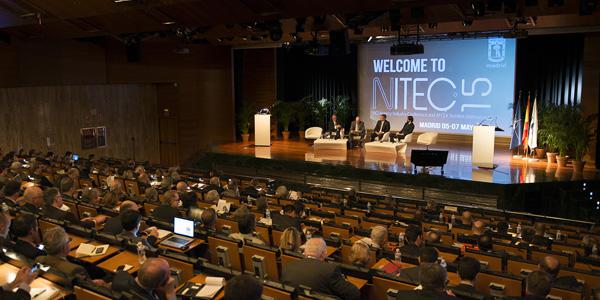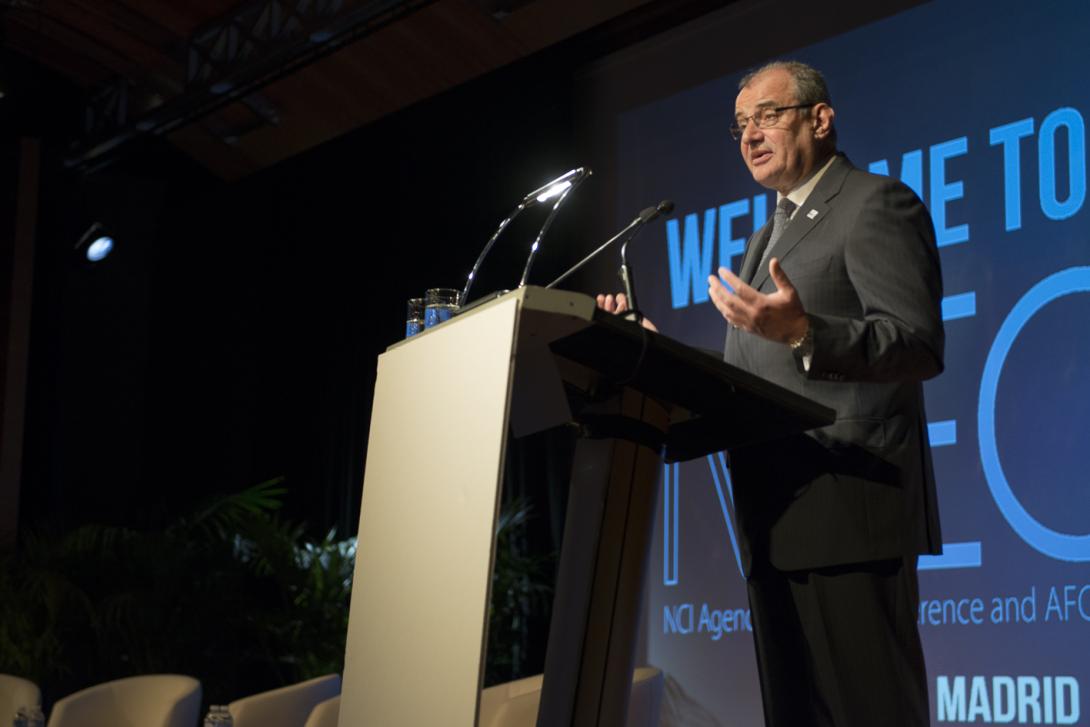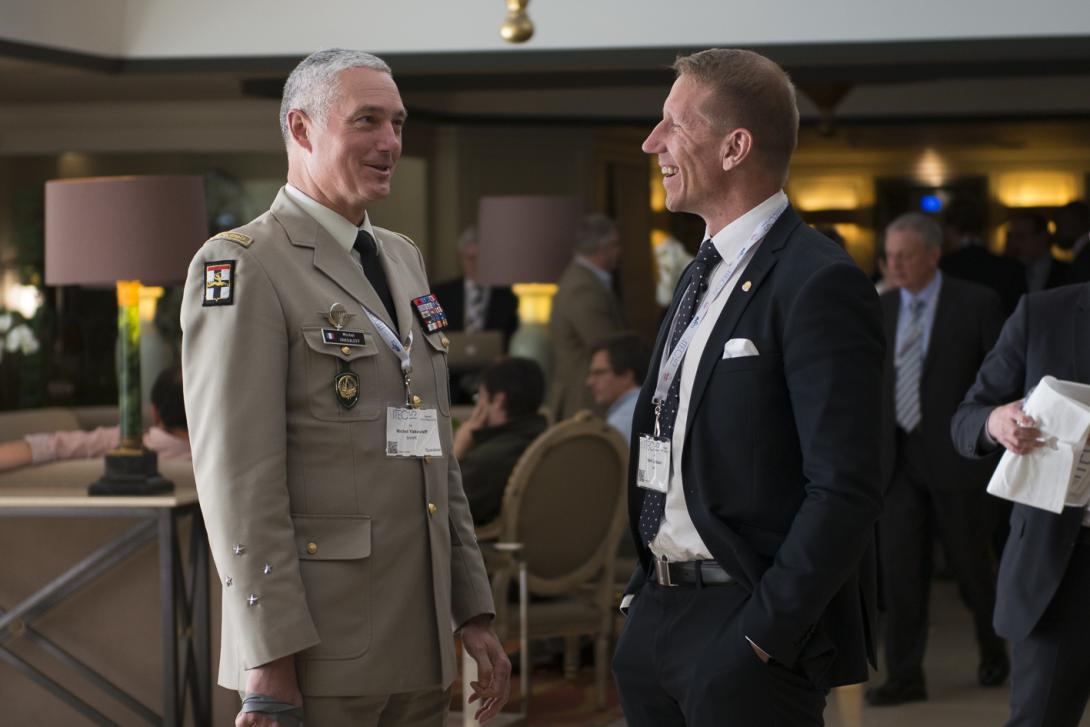Cooperation Shapes NITEC 2015
Extensive cooperation among NATO member nations, their industries and their academics will be necessary to address the challenges facing the Atlantic alliance, according to speakers at NITEC 2015. Some examples of that cooperation emerged during the May 5-7 conference in Madrid, which had a theme of “Enabling C4ISR: Applications, Education and Training.”
The NITEC show, being held for the fourth time, was born from the fusion of two yearly flagship events, AFCEA’s TechNet International and the NATO Communications and Information (NCI) Agency’s Industry Conference. It has become much more than a conference, enhanced, inter alia, by an exhibition with a large number of companies participating, several NATO-Industry workshops and about 80 ad hoc business-to-business meetings.
The success of the NITEC formula lies in the synergy and the intrinsic complementarity of capabilities and fields of operations unique to the two organizations. On the one hand, AFCEA International offers organizational capability and widespread penetration in the global defense industry, and on the other hand, NATO and its NCI Agency provide worldwide strategic, military and political-institutional power.
In the conference’s opening speech, a key concept was the breadth of global instability. “The world has changed dramatically over the last months, unfortunately, in a way that makes it less safe, less predictable and, to some extent, less cooperative,” said Maj. Gen. Klaus-Peter Treche, GEAF (Ret.), AFCEA Europe general manager. He focused on how the alliance and the European Union must find the appropriate answers to this changed and continuously evolving global scenario, pointing out that “effective and efficient cooperation between NATO bodies and industry will remain key to cope with the challenges that our armed forces are facing.”
Maj. Gen. Koen Gijsbers, RNLA (Ret.), NCI Agency general manager, reinforced the need for cooperation between NATO and the defense industry. “The conference is made for and by the industry,” he said, noting that NATO must change and needs industry to help with this change.
Some emphasis was put on small and medium enterprises (SMEs) and on their need to cooperate with big industries, together supporting NATO’s transformation process. Gen. Gijsbers also called for suggestions about how to implement NATO Information Technology Modernisation, a complex process that has to be achieved in only four to eight months, not in years. He invited industry to improve cooperation in all possible ways—both by taking part in new initiatives, such as the NATO Industry Cyber Partnership, and by participating actively in the usual ones: subscribing to the agency’s Basic Ordering Agreements, ensuring adherence to invitations to bid and so forth.
D. Pedro Argüelles Salaverria, Spanish secretary of state for defense, brought a welcome address from Spanish institutions. Salaverria warmly thanked both the NCI Agency and AFCEA for organizing the conference in Spain and gave an overview of the international situation, with specific regard to the great necessity for cybersecurity to face asymmetric threats, which have become the rule rather than the exception.
Lt. Gen. Mark O. Schissler, USAF, NATO Military Committee deputy chairman, spoke about several topical issues that contribute to the global picture. These include immigration flows from Africa to Europe via Italy, Greece and Spain, and cyberthreats, which are not only a military problem but also a serious issue affecting every one personally. He also mentioned the continuously and quickly changing threat scenario, which requires fast and innovative solutions. He spoke about the real need that everyone has to build trust.
A variety of speakers flavored the sessions with their views throughout the conference. Lt. Gen. Juan Manuel Garcia Montaño, Spanish National Armaments director, highlighted that cybersecurity is an asset that transcends national borders.
Vice Adm. Javier Gonzalez-Huix, SPN, NATO Allied Command Transformation, deputy chief of staff Joint Force trainer, said the NCI Agency has become a smarter customer that needs smarter providers. He mentioned that a way to achieve this target is participation in joint NATO/industry exercises.
Rear Adm. Elisabeth Natvig, NORN, Norwegian Ministry of Defense, chief of the Defense Policy and Long-Term Planning Department, focused on the strategic and geopolitical landscape and on the concerns produced by the current Russian position, which she characterized as “increasingly hostile and suspicious.” Furthermore, she said industry should increase its share in NATO business, not only to compensate for the shrinking defense market and budgets, but also because each company can efficiently perform the activities within its competence, allowing militaries to concentrate on operations.
Stephen Prentice, Gartner vice president and fellow, spoke about the Internet of Things. Hundreds of billions of devices are expected to be in network by 2050, according to IBM. Despite the undeniable benefits produced by the diffusion and growth of “smart systems,” they will gain the power to take decisions out of human control. Humans will become “nodes” of a network connected by devices. The future will be adding artificial intelligence to almost anything, leading to huge risks and opportunities. But the real challenge is adding ethics, morality, legality and privacy, not technology.
Maj. Gen. Carlos Gomez Lopez de Medina, SPA, chief of Joint Cyber Command, Spain, offered a Day Two keynote that focused on cooperation among the public and private sectors and academia. This is mandatory under the Spanish National Cyber Security Strategy, as it is considered a very effective way to achieve the required coordination. It produces benefits in terms of cybersecurity and cost savings to all partners.
Gen. Treche condensed his view of the conference in his closing remarks. “We predominantly had excellent presentations delivered by highly experienced subject experts,” he stated. He added that the NCI Agency could successfully launch the NATO Industry Cyber Partnership and the SME engagement strategy. The conference question-and-answer sessions not only incorporated queries to clarify issues, but also to amplify previously discussed topics. Enlightening breakout sessions on business opportunities in the NCI Agency’s key capability areas occurred, and the well-organized and well-frequented exhibition offered leading-edge technology in many C4ISR-related domains.
He added that some 80 business-to-business “speed dating” sessions helped enhance business opportunities for SMEs, and conference social events allowed networking beyond official business meetings at the conference and exhibition area while providing unique opportunities to learn about Spain and its traditions.
In closing, Gen. Gijsbers described his vision: “NATO should be as quick in peace as it is in crisis or war.” The partnership between the NCI Agency and industry indubitably makes NATO stronger, and this has to be pursued even in the future, along with engaging SMEs. He analyzed the achievements and progress of the agency’s road map, identifying building trust as the main improvement area. Gen. Treche announced that the next large event, TechNet Europe, will take place October 20-22 in Berlin. Nele Loorents, Estonian Ministry of Defense, Infrastructure Department director and acting undersecretary for Defense Investments, officially announced that NITEC 2016 will be held in Estonia.






Comments